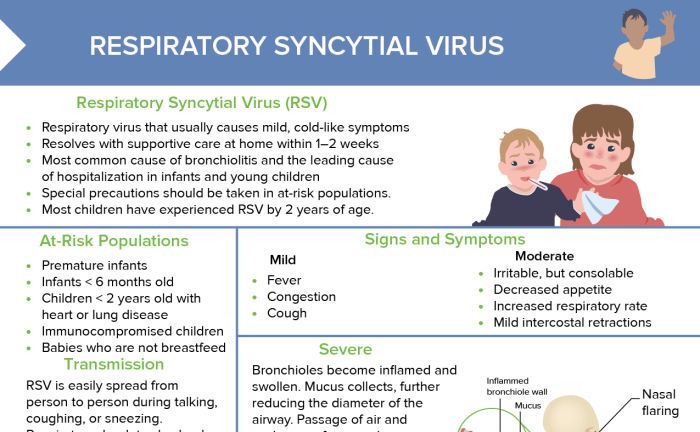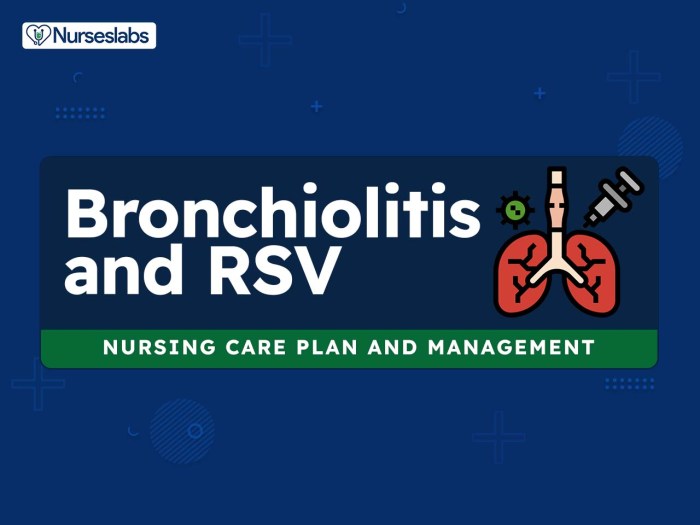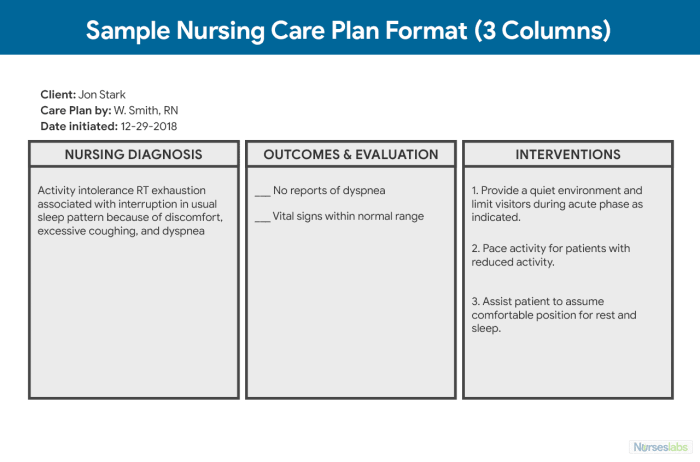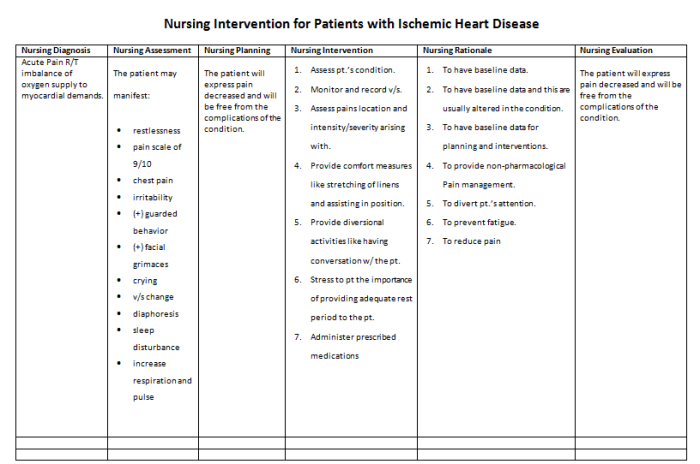Introducing the comprehensive nursing care plan for RSV infection, a meticulously crafted guide that empowers nurses with the knowledge and strategies to effectively manage patients afflicted with this prevalent respiratory illness. As we delve into the complexities of RSV infection, this plan serves as an invaluable resource, providing a roadmap for optimal patient care.
RSV infection, a highly contagious respiratory virus, poses a significant threat to vulnerable populations, including infants, young children, and the elderly. Understanding the signs, symptoms, and risk factors associated with RSV infection is crucial for early detection and timely intervention.
This care plan provides a comprehensive overview of these aspects, equipping nurses with the necessary knowledge to make informed decisions.
Nursing Assessment

Assessing a patient with RSV infection requires a comprehensive evaluation of subjective and objective data to determine the severity of the infection and guide appropriate interventions.
Subjective Data
- Symptoms:The patient may report symptoms such as runny nose, congestion, cough, fever, wheezing, difficulty breathing, and fatigue.
- Past medical history:Inquire about any history of respiratory infections, especially RSV, and underlying medical conditions like asthma or chronic lung disease.
- Immunization status:Determine if the patient has received the RSV vaccine or has had previous exposure to the virus.
Objective Data
- Physical examination:Assess the patient’s vital signs, including temperature, heart rate, and respiratory rate. Examine the lungs for auscultation of wheezes, crackles, or diminished breath sounds.
- Laboratory tests:Obtain a nasopharyngeal swab for RSV testing to confirm the diagnosis. Blood tests may reveal elevated white blood cell count or electrolyte imbalances.
- Imaging studies:Chest X-rays may show signs of pneumonia or bronchiolitis, especially in severe cases.
Risk Factors and Predisposing Conditions
- Age:Infants and young children are most susceptible to severe RSV infection.
- Prematurity:Premature infants have immature immune systems, making them more vulnerable to RSV.
- Underlying medical conditions:Chronic lung disease, asthma, and heart conditions can increase the risk of severe RSV infection.
- Exposure to secondhand smoke:Exposure to tobacco smoke irritates the respiratory tract, making it more susceptible to infection.
- Crowded environments:Daycare centers and schools can facilitate the spread of RSV.
Nursing Diagnosis

Respiratory syncytial virus (RSV) infection is a common respiratory illness that can cause significant morbidity and mortality, particularly in infants and young children. The nursing diagnosis for a patient with RSV infection should be based on the patient’s signs and symptoms and should take into account the potential complications of the infection.
The most common nursing diagnoses for patients with RSV infection include:
- Ineffective airway clearance related to increased mucus production
- Impaired gas exchange related to airway inflammation and bronchospasm
- Activity intolerance related to fatigue and shortness of breath
- Risk for infection related to impaired immune function
The priority of the nursing diagnoses should be based on the patient’s condition and the potential impact of the infection on the patient’s health. In general, the most urgent nursing diagnosis is ineffective airway clearance, as this can lead to respiratory distress and hypoxia.
The other nursing diagnoses should be addressed as needed to prevent complications and promote the patient’s recovery.
Nursing Care Plans
The nursing care plan for each nursing diagnosis should include specific goals, interventions, and evaluations. The goals should be realistic and achievable, and the interventions should be based on evidence-based practice. The evaluations should measure the patient’s progress towards the goals.
Creating a nursing care plan for RSV can be challenging, but it’s crucial for effective patient care. To enhance your knowledge, consider exploring the insightful resources available at unit 7 session 5 letrs . This platform offers valuable information that can complement your understanding of nursing care plans for RSV, empowering you to provide optimal care to your patients.
Nursing Interventions

Nursing interventions are essential in managing RSV infection and preventing complications. These interventions aim to alleviate symptoms, prevent the spread of infection, and promote recovery.
Nursing interventions are designed based on the specific nursing diagnoses identified during the assessment phase. Each intervention has a specific rationale and expected outcome.
Respiratory Management
- Maintain airway patency:Suction secretions as needed to prevent airway obstruction and facilitate breathing.
- Administer oxygen therapy:Provide supplemental oxygen as prescribed to improve oxygenation and reduce respiratory distress.
- Encourage deep breathing exercises:Instruct the patient to perform deep breathing exercises to promote lung expansion and prevent atelectasis.
Infection Control
- Implement isolation precautions:Place the patient in a private room and use personal protective equipment (PPE) to prevent the spread of infection.
- Practice meticulous hand hygiene:Wash hands frequently with soap and water or use an alcohol-based hand sanitizer to prevent the transmission of the virus.
- Clean and disinfect surfaces:Regularly clean and disinfect surfaces in the patient’s room and equipment to eliminate potential sources of infection.
Symptom Management
- Administer antipyretics:Give acetaminophen or ibuprofen as prescribed to reduce fever and discomfort.
- Provide rest:Encourage the patient to rest and avoid strenuous activity to conserve energy and promote recovery.
- Offer fluids:Provide adequate fluids to prevent dehydration, especially in infants and young children.
Nutritional Support
- Monitor nutritional status:Assess the patient’s nutritional intake and provide nutritional support as needed to maintain adequate nutrition and prevent malnutrition.
- Encourage oral intake:Encourage the patient to eat and drink as tolerated to meet nutritional needs.
- Administer enteral or parenteral nutrition:Provide enteral or parenteral nutrition if the patient is unable to meet nutritional needs orally.
Patient Education
- Educate about RSV infection:Provide information about RSV infection, its symptoms, and treatment to empower the patient and their family.
- Emphasize infection control measures:Teach the patient and their family about the importance of infection control measures, such as hand hygiene and respiratory etiquette.
- Encourage follow-up care:Instruct the patient to follow up with their healthcare provider as directed to monitor their recovery and address any concerns.
Nursing Evaluation: Nursing Care Plan For Rsv

Evaluation is an essential component of the nursing care plan, as it allows nurses to assess the effectiveness of the interventions and make necessary modifications. To evaluate the effectiveness of the nursing care plan for RSV, nurses should:
Indicators of Progress
- Improvement in respiratory status, including decreased respiratory rate, increased oxygen saturation, and absence of wheezing.
- Increased fluid intake and adequate hydration.
- Absence of fever and other signs of infection.
- Improved appetite and weight gain.
- Compliance with medications and treatments.
- Understanding of RSV infection and its management.
Potential Modifications
Based on the evaluation findings, the nursing care plan may need to be modified. Potential modifications include:
- Adjusting the frequency or dosage of medications.
- Adding or discontinuing certain interventions, such as suctioning or oxygen therapy.
- Providing additional education or support to the patient and family.
- Referring the patient to other healthcare providers, such as a pulmonologist or infectious disease specialist.
Patient Education

Educating patients about RSV infection is crucial for effective prevention and management. By understanding the symptoms, treatment options, and preventive measures, patients can play an active role in their health.
Furthermore, empowering patients with knowledge about the benefits of vaccination can help increase vaccination rates and reduce the spread of RSV infection.
Symptoms and Treatment
- RSV infection typically presents with cold-like symptoms such as runny nose, cough, and fever.
- In severe cases, it can lead to lower respiratory tract infections like bronchiolitis and pneumonia.
- Treatment focuses on supportive care, including rest, fluids, and medications to relieve symptoms.
- Antiviral medications may be prescribed in certain cases.
Prevention, Nursing care plan for rsv
Preventing the spread of RSV infection involves implementing good hygiene practices and respiratory etiquette.
- Frequent handwashing with soap and water or using alcohol-based hand sanitizer is essential.
- Covering coughs and sneezes with a tissue or the crook of the elbow helps prevent the spread of respiratory droplets.
- Staying home when sick and avoiding contact with vulnerable individuals is also important.
Vaccination
Vaccination is a safe and effective way to protect against RSV infection. It is recommended for infants, young children, and adults with underlying health conditions.
- The vaccine is administered as a series of injections.
- It does not guarantee complete protection but can reduce the severity of symptoms and the risk of hospitalization.
Common Queries
What are the common symptoms of RSV infection?
Symptoms of RSV infection can range from mild to severe and may include fever, cough, runny nose, wheezing, and difficulty breathing.
Who is most at risk for developing RSV infection?
Infants, young children, and the elderly are most susceptible to RSV infection due to their immature or weakened immune systems.
How is RSV infection spread?
RSV infection is spread through contact with respiratory droplets produced by an infected person when they cough or sneeze.